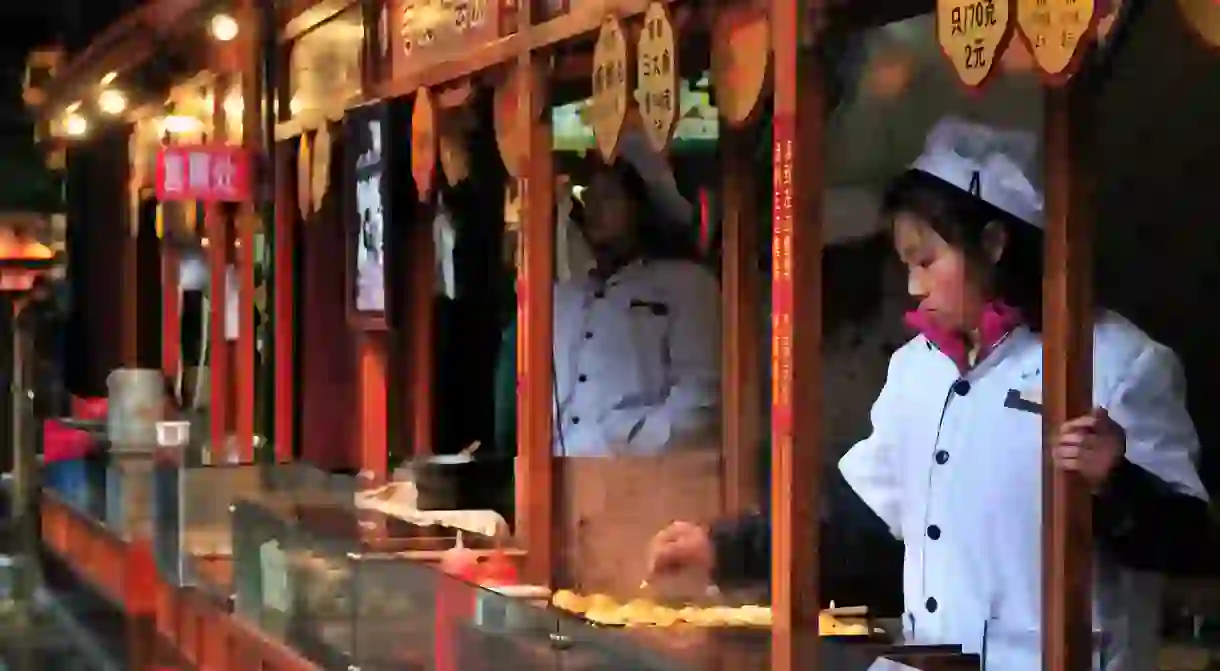The Best Street Food Spots in Shanghai

Shanghai offers an abundance of delicious street food options, but the stalls can be a little tricky to find, so follow Culture Trip’s guide and find your way to the best street food spots in the city.
Shanghai is a great destination for fans of street food, with tiny stalls and hole-in-the-wall restaurants with sizzling woks and serving delicious plates dotted around every neighbourhood. These friendly, family-run joints dish up simple, cheap eats from all corners of China and are a great way to fuel your exploration of this amazing city.
Xiangyang Road Food Stalls
Food Stall, Hole in the Wall, Chinese, Street Food
For a classic Shanghai street food experience, head to these hole-in-the-wall joints at the on Xiangyang Road in the former French Concession. These tiny stalls serve up delicious morsels such as potstickers, jianbing (Chinese savoury pancakes) and steamed buns. The area is especially busy in the early mornings as Shanghai workers stop by for a quick on-the-go breakfast.
South Yunnan Road Food Street
Food Stall, Food Stand, Hole in the Wall, Chinese, Street Food
The area around South Yunnan Road is a feast for the senses, with smoke and chatter rising from its many stalls. It’s been renowned as a food street since the 19th century, and some establishments here claim to be more than 100 years old. Look out for Shaanxi-style dumplings and noodles, as well as classic Cantonese dim sum, Mongolian hotpot and steamed dumplings. It’s a great place to refuel after museum hopping around the nearby People’s Square.
Wujiang Road Food Street
Food Stall, Food Stand, Chinese
Wujiang Road is a more modern, purpose-built take on street food, located just off West Nanjing Road and easily accessible from the metro station of the same name. Most visitors come here to sample different snacks while shopping in the area. Everything here is a bit more regimented and defined, removing the characteristic chaos you’ll find on other food streets. Try the shengjianbao, a pan-fried bun filled with meat and juices; or congyoubing, the infamous savoury scallion pastry – both Shanghainese specialities.
Old Town God Temple Snack Street
Restaurant, Food Stall, Food Stand, Chinese
Some of Shanghai’s most well-known eateries line this busy snack street, hidden along Fuyou Road in Huangpu District. The restaurants and stalls are housed in recreated Ming and Qing dynasty buildings, aesthetically in keeping with nearby Yuyuan Garden. You will find most Shanghai favourites here, including fried or steamed stuffed buns, fried rice cakes and decadent crab-shell cake, as well as an eatery that specialises in tofu dishes.
The Friday Muslim Market
Market, Chinese
For something a little different, head to the Muslim Market on a Friday (open from 11am to 3pm). This collection of stalls is casually set up around Changde Road (near Aomen Road), where you can wander from vendor to vendor sampling the delicacies of China’s Muslim ethnic groups. You know you’re heading in the right direction when you see smoke rising from the countless kebab grills, which attract the longest queues. Gorge yourself on skewered lamb, , delicious Uyghur samsa, polo (spiced lamb rice pilaf with onions, carrots and apricots), freshly baked nang bread sprinkled with caramelised onion and sesame seeds, as well as thick yoghurt served with honey and raisins.
East Yuhang Road Breakfast Market
Market, Chinese
While the historic fabric of the Hongkou district is being demolished fast, the breakfast scene remains one of the final frontiers resisting the hasty strokes of modernisation. Walk ten minutes north from the Jewish Refugee Museum, and you can sample everything from oven-baked Hui-Muslim flatbread, to fermented rice pancakes hailing from the central Hubei province. The neighbourhood has preserved a communal lifestyle which dates back to the late 1930s, and exudes a synergy between migrant merchants and residents that is rarely found in a rapidly globalising city.













